Key takeaways:
- Understanding various pricing structures and warranties is crucial when evaluating solar deals.
- Preparation and research significantly enhance negotiation outcomes, enabling confident and informed discussions.
- Framing offers to align with the seller’s motivations can increase the likelihood of acceptance.
- Maintaining calm, recognizing the right timing, and addressing details effectively are key to successfully closing negotiations.
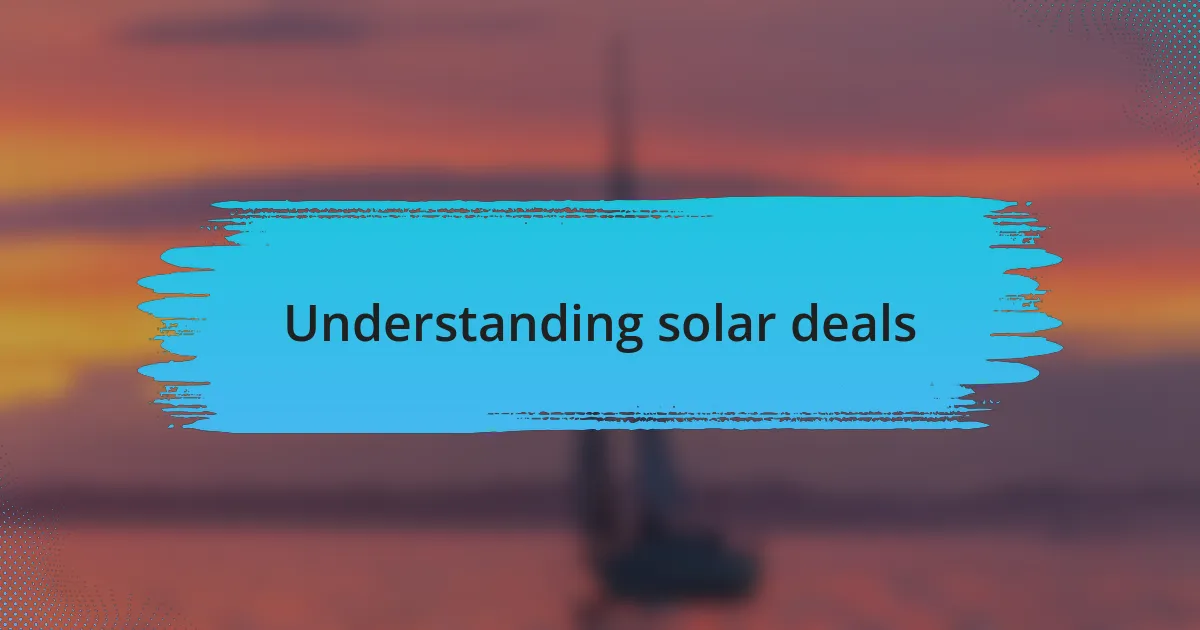
Understanding solar deals
Understanding solar deals requires clarity on various factors, such as pricing structures and warranties. Sometimes, I find myself surprised by the variety in offers, especially when you consider the initial investment versus the long-term savings. Have you ever thought about how the energy output from solar panels can significantly reduce fuel costs on a yacht?
Typically, solar deals come with options for purchase or lease, and each has its pros and cons. I remember when I first looked at leasing; I thought it was a no-brainer. However, I soon realized that owning my system might be more beneficial in the long run, particularly when factoring in potential resale value. Isn’t it essential to weigh such options carefully?
Another critical aspect is understanding the installation and maintenance agreements. I’ve learned that a robust warranty can be a lifesaver if something goes wrong later. Have you ever experienced spending more on maintenance than you initially budgeted? Feeling secure in your investment means having a solid understanding of how the deal plays out over time.
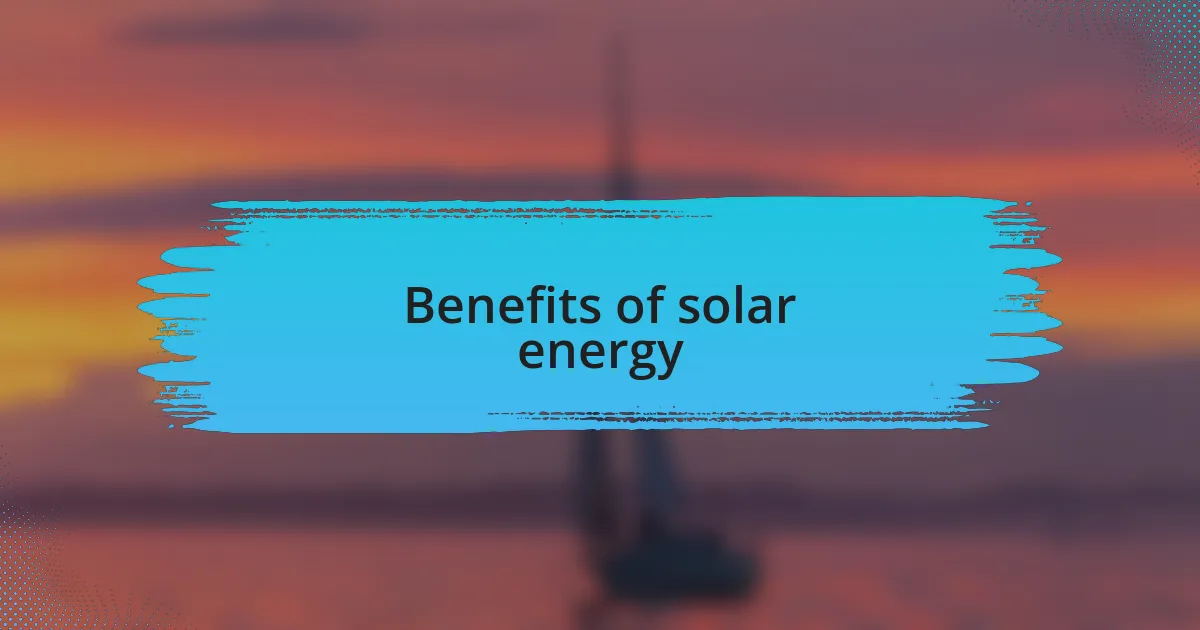
Benefits of solar energy
The advantages of solar energy aren’t just numbers; they’re palpable benefits that enhance the yacht experience. When I first made the switch, the freedom from the noise and exhaust of traditional generators was an absolute game changer. Imagine enjoying a peaceful evening under the stars, powered entirely by the sun, without the typical distractions. Isn’t that the kind of tranquility every yacht enthusiast dreams of?
Financially, going solar can provide incredible savings over time. I’ve calculated my energy costs, and the reduction after installing solar panels has been striking. It felt liberating to watch my fuel expenses dwindle, allowing me to allocate those savings toward experiences instead of just fuel—like a spontaneous trip to a hidden cove. Have you thought about how solar energy could turn your adventures into something more meaningful?
Moreover, solar panels contribute to a more sustainable lifestyle, which is increasingly important to me and many of my fellow yacht owners. Being able to harness renewable energy while exploring pristine waters creates a sense of responsibility in preserving these beautiful environments. How satisfying is it to know that your vessel is not only luxurious but also eco-friendly?
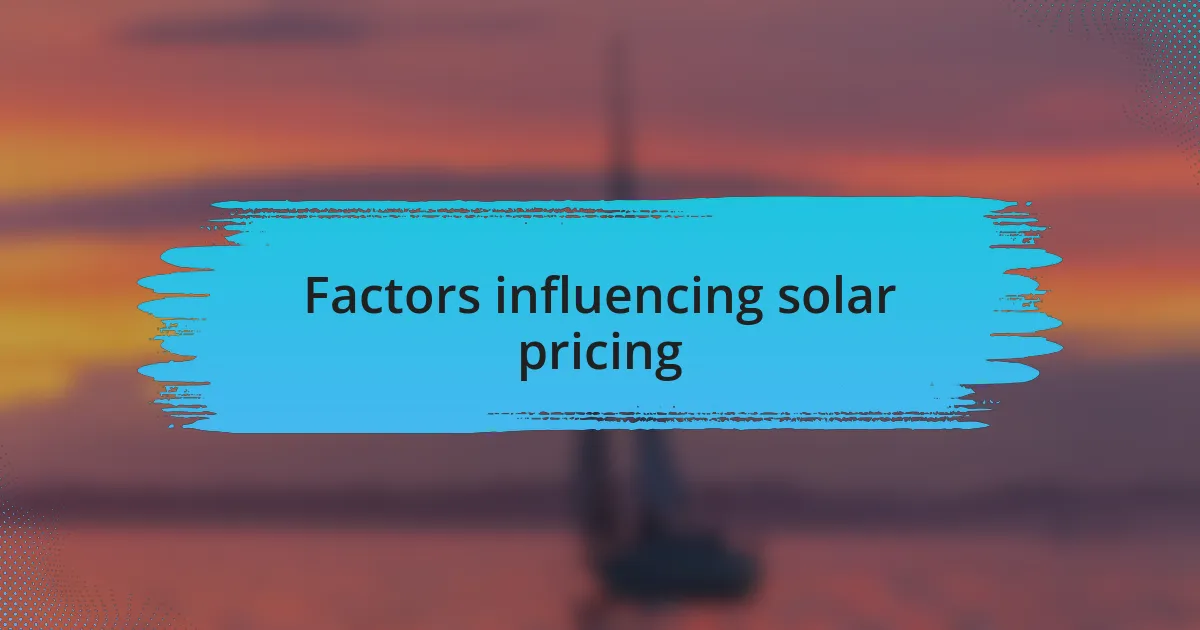
Factors influencing solar pricing
The pricing of solar installations can be significantly affected by the quality of the components used, such as the solar panels and inverters. From my experience, investing in higher-quality equipment can initially seem more expensive, but it pays off through increased efficiency and longevity. Have you ever opted for a less expensive option and regretted it later? I know I have.
Another crucial factor in solar pricing is installation costs, which can vary widely based on your location and the complexity of the installation. I remember when I was scouting for installation services; I quickly realized that having a seasoned technician made a world of difference, not just in execution but also in the fine-tuning that maximizes output. So, don’t just settle for the first bid; it’s worth getting multiple quotes and considering the expertise behind them.
Government policies and incentives also play a significant role in determining solar pricing. In my case, I was fortunate to benefit from rebates that made the switch much more affordable. Have you looked into what incentives might be available in your area? Understanding these can add tremendous value to your investment and bring that dream of solar-powered luxury one step closer.
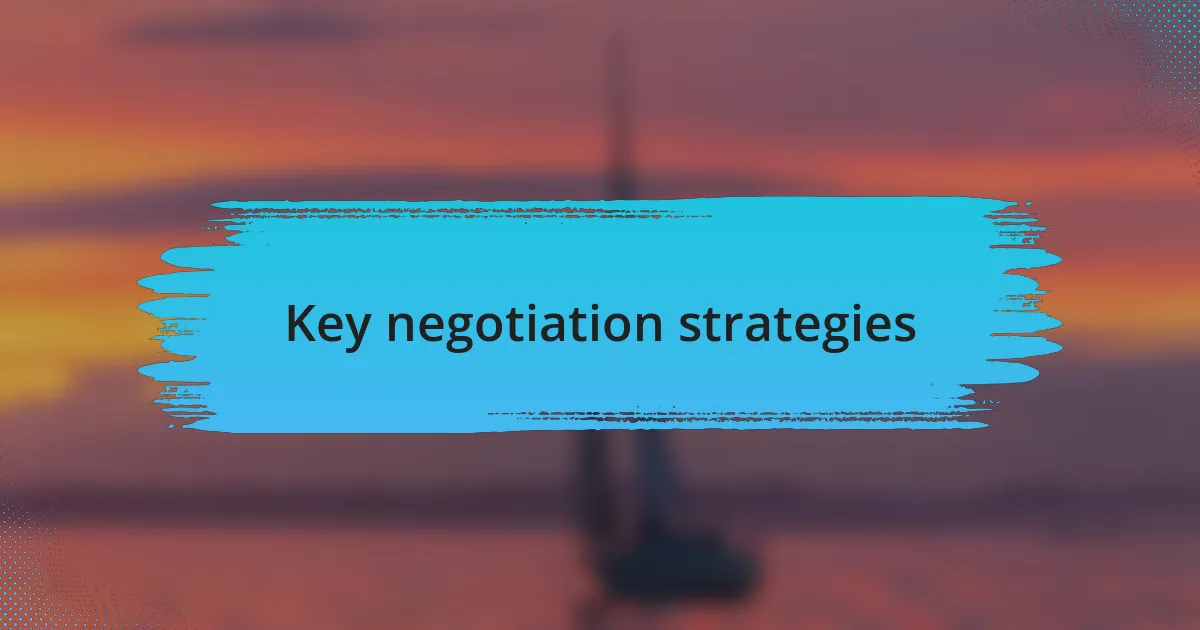
Key negotiation strategies
When negotiating solar deals, one of the most effective strategies is to do your homework. I recall a time when I prepared a detailed comparison of various solar packages before entering a negotiation. This preparation not only gave me confidence but also allowed me to leverage information about competitors’ offers to my advantage. Have you ever walked into a discussion without knowing all your options? It can leave you feeling vulnerable.
Another key strategy is to cultivate a relationship with the seller. I found that when I took the time to build rapport, the negotiation became more fluid and collaborative. This personal connection often opens doors to better deals and additional perks that might not be mentioned in a standard proposal. It’s interesting how a friendly conversation can sometimes yield unexpected benefits, isn’t it?
Finally, don’t hesitate to ask for what you want, as it can be surprising what you might get just by stating your needs clearly. During one negotiation, I hesitated to mention my budget constraints, thinking it might scare them off. When I finally did, the sellers were more than willing to offer adjusted plans that met my budget. Have you ever held back in negotiations and later regretted it? Speaking up can be the difference between merely settling for a deal and securing an agreement that truly meets your needs.
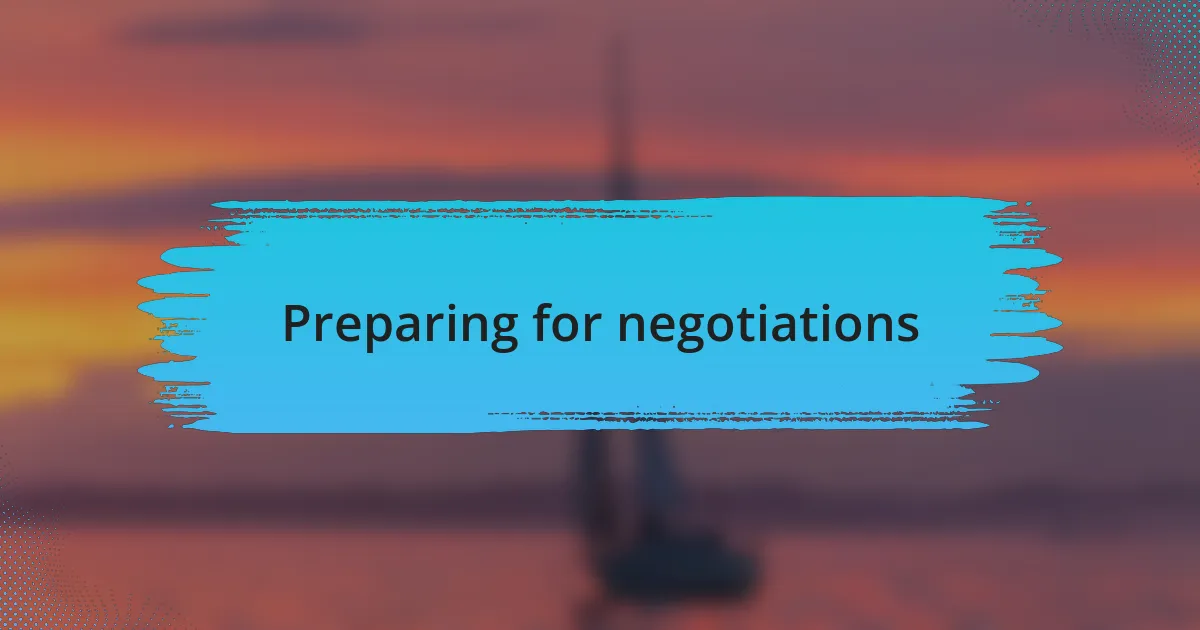
Preparing for negotiations
Preparing for negotiations requires a clear understanding of your objectives and the specific outcomes you desire. One time, I made a list of key points I wanted to cover and prioritized them based on their importance. This focused approach helped me stay on track and avoid getting sidetracked by less critical issues during the discussion. Have you ever felt overwhelmed during negotiations? Having a roadmap can really alleviate that pressure.
It’s also crucial to familiarize yourself with the seller’s position and motivations. I once attended a meeting where I had researched the seller’s previous projects and their success stories. This enabled me to align my offer with their interests, which created a more compelling case for collaboration. Have you ever engaged someone by speaking their language? It can create a deeper connection and make you more persuasive.
Finally, practice makes perfect. I remember role-playing negotiation scenarios with a friend, which helped me identify potential pitfalls and refine my communication style. Preparing in this manner not only boosted my confidence but also allowed me to approach the actual negotiations with a clear mind and a sense of ease. When was the last time you practiced a difficult conversation? It can often lead to unexpected breakthroughs.

Crafting your offer
Crafting your offer is all about aligning your proposal with both your needs and the seller’s motivations. I recall a negotiation where I didn’t just lay out my price; instead, I framed my offer around their unique selling points. This approach not only showcased my understanding of their value but also increased the likelihood of acceptance. Have you ever considered how personalizing your offer could shift the perspective of the other party?
Understanding the numbers behind your offer is crucial. In one instance, I backed my proposal with detailed cost analysis and potential ROI metrics, which resonated deeply during the discussions. It was a game-changer; showcasing the financial benefits made my offer more than just a price—it transformed it into a strategic opportunity. Have you thought about how presenting data can enhance your negotiating power?
I always remember to highlight the win-win aspect of my offer. In a recent deal, I emphasized how our collaboration could benefit both parties through shared marketing opportunities and brand visibility. This not only sweetened the deal but also fostered a sense of partnership from the onset. Isn’t it fascinating how framing an offer as mutually beneficial can pave the way for smoother negotiations?
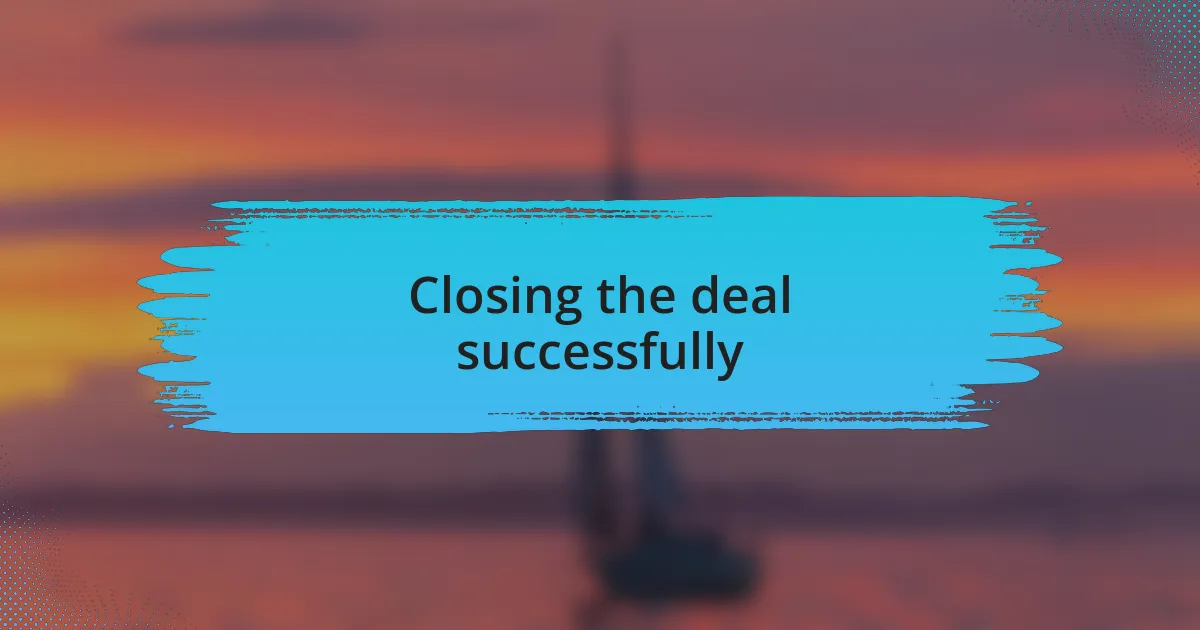
Closing the deal successfully
Successfully closing the deal is an art form that requires confidence and clarity. I once found myself at the final negotiation table for a solar system installation, and as the discussions intensified, it became vital to remain calm and assertive. I remember clearly how taking a moment to breathe and reiterate our shared objectives helped ease the tension and reaffirm our commitment to the project’s vision. Have you ever noticed how maintaining a steady demeanor can influence the outcome of a negotiation?
Another key element is the power of timing. In my experience, knowing when to push for an agreement can make all the difference. During a recent contract negotiation, I sensed that the timing was right and confidently proposed we finalize the deal on the spot. To my surprise, the seller appreciated the urgency and agreed, illustrating how recognizing the right moment can lead to a swift and favorable resolution. Do you believe that a well-timed proposal could enhance your chances of closing successfully?
It’s also essential to prepare for the final steps. I always make a checklist that includes reviewing key terms, confirming mutual understanding, and addressing any last-minute concerns. There was one time when a small overlooked detail could have derailed the entire process. But by addressing it head-on and showing my willingness to find a solution together, we cemented trust and finalized the agreement with confidence. Have you evaluated the little details that might trip you up at the end of your negotiations?